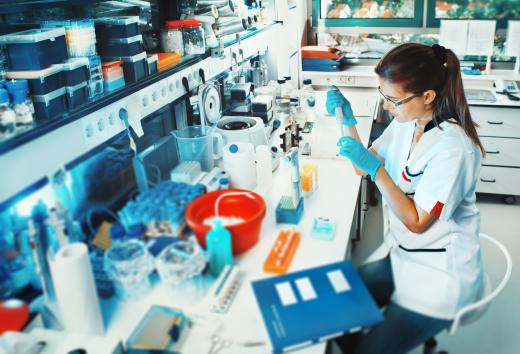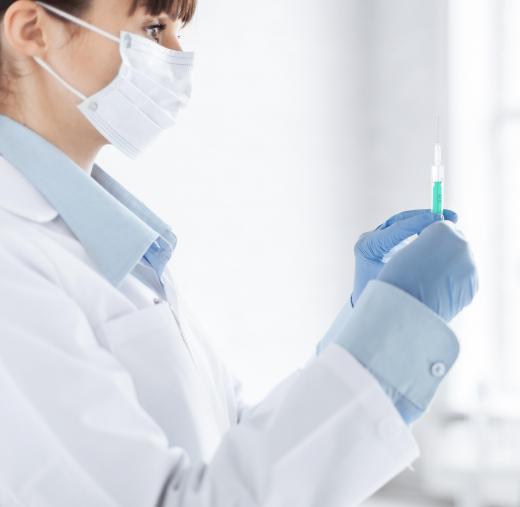What is a Clinical Biochemist?
A clinical biochemist is a trained scientist who researches the structure and functions of different chemicals found in human bodies. He or she may work in a medical laboratory, analyzing the contents of tissue, fluid, and blood samples to identify pathogens and other abnormal conditions. Some clinical biochemists work in biotechnology institutions or pharmaceutical companies, researching the medical implications of different drugs and chemicals in humans.
In hospitals and independent medical laboratories, clinical biochemists evaluate the chemical composition of human tissue and fluid samples. Biochemists, who are usually assisted by clinical laboratory technicians and technologists, perform experiments to detect the presence of viruses, bacteria, or irregular or maladaptive substances. A clinical biochemist typically uses a number of different complex laboratory instruments to conduct experiments, such as microscopes, cell counters, and chemical analyzers. A scientist will carefully document his or her findings and report results to a physician, who can prescribe the appropriate medication or treatment to the patient.

A clinical biochemist who works in the biotechnology or pharmaceutical industry closely studies the chemical structures of healthy and diseased tissue samples from living things. He or she may try to understand the composition of a new or rare strain of disease, in order to develop effective medications or vaccinations against it. A clinical biochemist may also oversee research studies and clinical trials of new medications. He or she is responsible for ensuring that the drug is effective and safe for humans before it can be mass marketed.

To become an independent clinical biochemist, a person must typically receive a PhD in chemistry, molecular biology, or a related biological science field. Upon completion of a PhD program, a scientist usually attains a postdoctoral research position at a hospital or medical laboratory, where he or she gains firsthand experience by assisting established clinical biochemists. After as many as three years in a research program, a scientist is eventually given the opportunity to begin conducting independent research.

Most clinical biochemists work about forty hours a week with regular days off. Since hospitals usually operate 24 hours a day, seven days a week, many scientists employed by on-site medical laboratories are required to work nights and weekends. Some professionals assume on call status, coming to work when an emergency situation requires the immediate analysis of a sample. There is generally a strong demand for experienced clinical biochemists, especially in large hospitals, to accurately identify diseases and prevent them from spreading to others.
AS FEATURED ON:
AS FEATURED ON:















Discussion Comments
@David09 - I agree. I think that even secondary positions, like a clinical research assistant, would require some postgraduate work.
Science is a highly specialized field of study, and a bachelor’s degree just won’t cut it anymore. I don’t think that you can even write for a peer reviewed journal if you’re only credential is a bachelor’s degree, even if by some serendipity you stumble upon some great scientific breakthrough.
My wife received her degree in biochemistry. Unfortunately, she never went further with it. She didn’t pursue a PhD, choosing instead to stay with her Bachelor’s degree.
Originally her plan was to move on to medical school but those plans were scuttled. She now works in a pharmacy as a pharmacy technician. She enjoys it, but you certainly don’t need a biochemistry degree for that position.
My advice to anyone wanting to pursue clinical scientist jobs is to make sure that you go for the PhD, or the Master’s as a minimum. With a Master’s degree you may be able to get an adjunct teaching position, if not an actual teaching position itself, at most colleges.
Post your comments